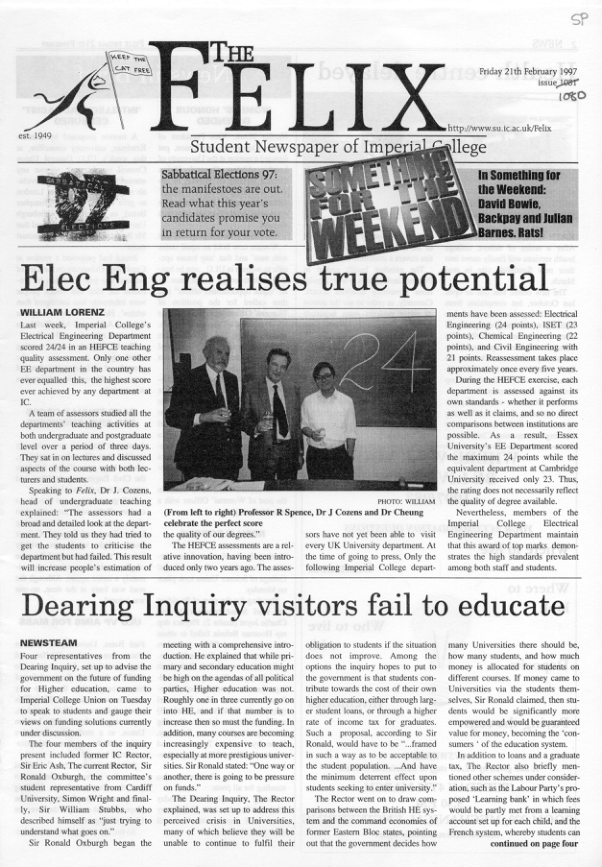Pepsi canned after Burma protest
US snack giant Pepsi intends to withdraw completely from the Union of Myanmar (Burma) by 31st May, according to a statement issued by Oliver Wheeler, Pepsico’s UK Head of Public Affairs.
In November last year, Third World First and several other student organisations in Europe and America informed Pepsi that they were considering instructing their members to boycott Pepsi’s soft drinks. They were followed this year by the National Union of Students and ULU.
The student organisations cited Pepsi’s continued presence in Burma, alledgedly selling Cola in collaboration with the country’s oppressive ruling junta, the State Law and Order Restoration Council.
Last month, Pepsi relented and announced its intention to discontinue all operations in Burma. Although many of the student organisations supporting the boycott claimed a victory, Mr Wheeler was quick to refute their claims that Pepsi’s decision was a result of their action. Speaking to Felix, Mr Wheeler went on to claim that the reasons behind the withdrawal could not be so easily expressed.
Pepsi’s involvement with Burma began early this decade, when Aung Sun Suu Kyi, the leader of Burma’s National League for Democracy, appealed to foreign companies to invest in Burmese industry, believing that SLORC would soon restore the democratic constitution, suspended in 1988.
Pepsi was among those companies which responded to the call. To ensure effective distribution of its product in the long term, Pepsi must secure a great deal of investment in a country’s infrastructure and industry.
Essentially, all Pepsi soft drinks are produced at a single site in the United States, from where they are transported in concentrate form to the country of destination. There, the concentrates are diluted, carbonated bottled and labelled. This process is always carried out by a local firm, operating under an extended licencing agreement with Pepsi.
This method of distribution was adopted in Burma, and, in accordance with Suu Kyi’s wishes, Pepsi was permitted to hold assets, employees and investments in Burma’s usually closed regime.
However, as the chance to restore democracy in Burma faded, The former leader appealed to international companies with assets in Burma to withdraw their investments, seeing this as a way of exerting pressure on SLORC and the Prime Minister, General Than Shwe.
According to Mr Wheeler, Pepsi made every effort to disengage its distribution network from the South-East Asian state, but were bound by a long-term contract with a Burmese bottling firm. To breach this contract would in turn be against international law.
In order to break the agreement, Pepsi needed US foreign policy towards Burma to permit, or at least appear to permit, the premature severence of contracts between US and Burmese companies. At the time of Suu Kyi’s appeal, such a change in policy seemed unlikely.
As a result, Mr Wheeler claims, Pepsi tried to withdraw everything it could without actually breaking the contract. This included all investments, assets and employees. After April last year, shipments of cola concentrate remained the only form of trade between the two firms.
Despite these developments, in November Mr Wheeler received a communication from a number of student organisations threatening to boycott Pepsi and its products. Many of these threatened boycotts came into effect at the beginning of the year. In January, Pepsi re-examined US policy towards Burma and interpreted it to permit a breach of contract with the bottling firm. On January 15th, Mr Wheeler issued the following statement:
"Based on our assessment of the spirit of current US foreign policy we are completing our total disengagement from the Burmese market. Accordingly we have severed all relationships with our former franchise bottler, effective May 31st. The bottler in Burma is taking appropriate steps to ensure that all production and distribution of our products are ceased by May 31st 1997."
Whilst consisitently denying that the disengagement came as a result of the boycotts, Mr Wheeler conceded that they may well have played a part in Pepsi’s decision. The larger, federal student’s unions such as ULU and the NUS constitute powerful buying groups and major consumers of Pepsi products. Last week, representatives of the University of London Union celebrated Pepsi’s climbdown, and made a show of drinking Pepsi products at a General Union Council meeting. Although they remain bullish, some of the ULU executive admitted that their own protest actions may have been overshadowed by threats from influential American Universities, including Harvard





